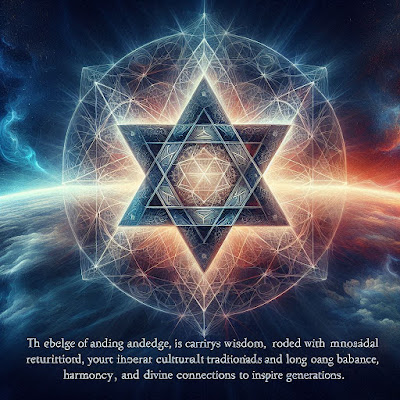The Wisdom of Prophet Idris (AS): The First to Teach Writing, Sacred Geometry, and Alchemy
Prophet Idris (AS), also known as Thoth and Hermes, introduced the transformative practices of writing, sacred geometry, and alchemy—unlocking profound spiritual and neurological potential.
Prophet Idris (AS), revered in Islamic tradition, holds a unique place as one of the earliest figures to wield the pen as a divine tool, teaching humanity profound practices that would shape civilization. Known as Thoth in Egyptian mythology and Hermes in Greek tradition, Prophet Idris' teachings transcend time, introducing the power of writing, sacred geometry, and alchemy to humanity—cornerstones of both spiritual and intellectual growth.
The Power of Writing: Prophet Idris is believed to be the first prophet to use the pen, recording divine knowledge and revealing its transformative potential. Writing, for him, was not merely a means of communication but a sacred practice that elevated the soul. It allowed for a connection between the material world and the divine, facilitating the transmission of higher wisdom. In Islamic tradition, this knowledge was passed down through generations, shaping the foundation of intellectual and spiritual thought.
Sacred Geometry: The connection between Prophet Idris and sacred geometry underscores his profound understanding of the universe's inner workings. Known as Thoth in Egyptian myth, he imparted the knowledge of sacred geometry—mathematical patterns, ratios, and proportions that mirror the underlying order of creation. These geometric patterns can be seen in the architecture of Egyptian temples, pyramids, and even in the natural world. Sacred geometry is more than a physical science; it is a spiritual tool that connects the microcosm (individual) with the macrocosm (universe).
Alchemy as Spiritual Transformation: Prophet Idris (AS) is also credited with teaching alchemy, but with a focus on spiritual transmutation rather than the physical transformation of matter. While alchemy is often thought of in terms of turning base metals into gold, for Prophet Idris, the true goal was the refinement of the soul. The alchemical process is symbolic of the inner transformation that occurs as individuals purify their minds and hearts. As ego and ignorance are transmuted, one becomes more attuned to the divine and attains a higher state of wisdom and enlightenment.
Neurological and Spiritual Dimensions: Prophet Idris' teachings are not just confined to esoteric spiritual practices but also intersect with the neurological sciences. Writing and studying sacred geometry have been shown to activate different areas of the brain, enhancing cognitive functions and promoting neuroplasticity—the ability of the brain to form new neural connections. Engaging with sacred geometry, for example, can promote problem-solving skills, spatial reasoning, and deep intellectual engagement, while writing fosters creativity, focus, and emotional processing. Furthermore, the study of alchemy—when viewed as a spiritual practice—mirrors the neural and emotional transmutation that occurs when one embarks on a path of self-refinement, unlocking deeper levels of wisdom and consciousness.
Conclusion: Prophet Idris (AS), through his dual identity as Thoth and Hermes, remains one of the most influential figures in the transmission of sacred knowledge. By introducing the divine power of the pen, the study of sacred geometry, and the transformative power of alchemy, he unlocked pathways for humanity to connect with the divine, advancing both spiritual and neurological evolution. His teachings continue to inspire the pursuit of knowledge, inner transformation, and enlightenment in both the intellectual and mystical realms.
Further Reading:
- The Teachings of Prophet Idris (AS) in Islamic Tradition
- Sacred Geometry: The Divine Blueprint of the Universe
- Alchemy: Spiritual Transmutation and Inner Transformation
- The Role of Writing in Spiritual and Neurological Evolution
- Neuroplasticity: How Sacred Practices Affect the Brain






Comments
Post a Comment